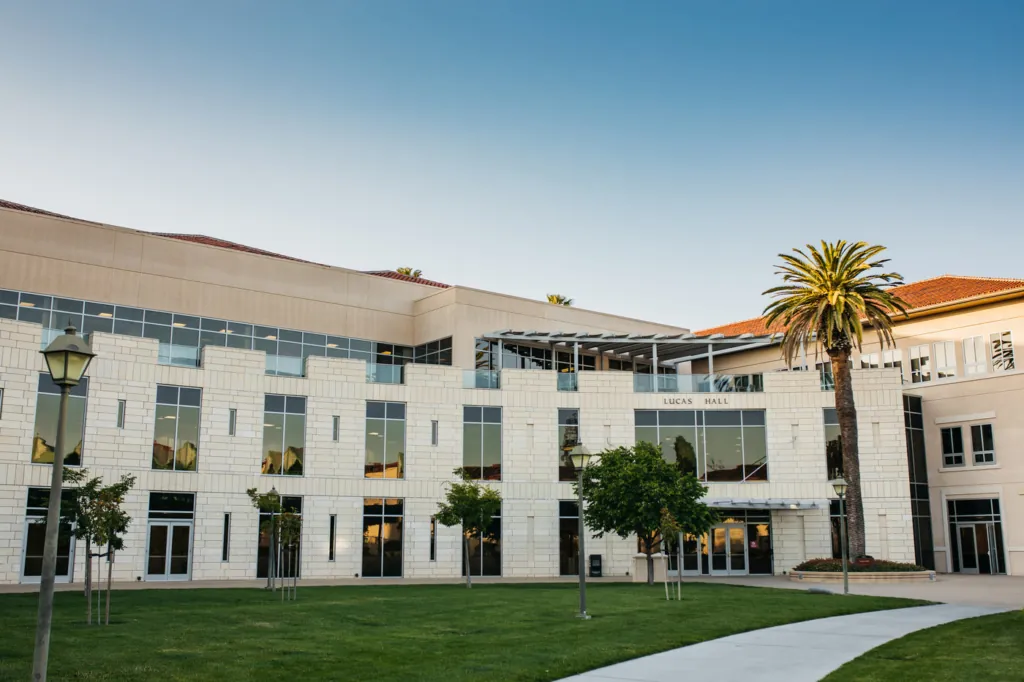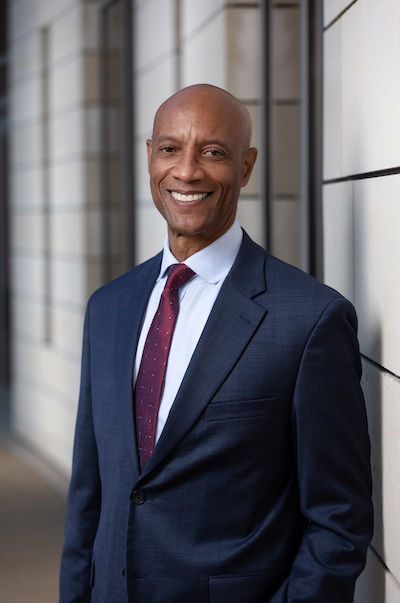
Santa Clara University Leavey School of Business
It was a good day at the Leavey School of Business at Santa Clara University. The U.S. News rankings had just been released, and the Leavey School had placed well in a pair of key categories.
Better than well — great. Leavey ranked No. 13 in executive education and, in its highest-ever placement, No. 19 for part-time MBA programs. Its online MBA, at No. 62, remains in the top 20% of all ranked programs.
In the administrative offices of Lucas Hall, the achievements were hailed with a vertical banner and balloons in the school’s maroon hue, and smiles and good cheer all round. On the heels of Leavey placing third overall in Poets&Quants’ ranking of online MBA programs — its highest-ever placement in that ranking, as well — there was an air of satisfaction and accomplishment on the sunny campus in the South San Francisco Bay.
“Many people call us a hidden gem,” says Nydia MacGregor, interim senior assistant dean for graduate business programs. “And I’d like to take the word ‘hidden’ away from that. I’d like us just to be the gem.”
PREPARING ‘LEADERS FOR FIRMS IN THE FUTURE’

Santa Clara Leavey Dean Ed Grier
There are lots of good days at Santa Clara Leavey lately, and recognition for the school’s efforts across several programs is only part of the reason. Another is its location — not only in the warm sun of the South Bay, itself almost reason enough to attend, but also as a not-so-hidden gem residing smack in the middle of Silicon Valley, one of only three major business schools that can make that claim.
The others: Stanford Graduate School of Business and UC-Berkeley Haas School of Business, Nos. 1 and 9, respectively, in the Poets&Quants 2022 ranking of top MBA programs.
“We are preparing people to be leaders for firms in the future,” says MacGregor, who leads the school’s graduate business programs, including oversight of admissions, program development, career management, and student services. In 2021, Leavey was second only to the Foster School of Business at the University of Washington in Seattle for alumni employed in the tech industry. “It happens that here in the Valley, we have a lot of tech, and we have a lot of firms that are cutting-edge in the way they approach their business model. That’s the dynamism that we’re preparing them for.
“We have some things that you literally can’t replicate anyplace else in the world. I tell students, ‘You’ve heard of the ivory tower, but we have a porous tower.’ There’s this porosity that occurs between the folks here in the Valley and what happens here in the building, a back-and-forth. And it’s because we have our part-time program and our students live and work here and they’re part of the community here.”
That sense of community was a big reason Leavey’s dean, Ed Grier, joined the school last year. A long-time Disney executive, Grier was dean at the School of Business at Virginia Commonwealth University when he paid a visit to campus in 2020 — and quickly fell in love.
“I was happy at VCU — we were doing great work, including the launch of the school’s online MBA,” he says. “But this opportunity came up and it worked out great. It’s a great university, great business school, and a great opportunity for me personally.”
THE GREATER GOOD
The Leavey School doesn’t have a full-time MBA program. It isn’t going to compete for talent or recognition with its juggernaut neighbors that dominate the major rankings, which focus heavily on the MBA to the exclusion of other programs. But it doesn’t have to. It has a unique set of offerings, whether inside its robust undergraduate program — which has a student population of around 500, nearly half of whom are women and in which two dozen countries are represented — or its growing online MBA or popular part-time MBA or slate of innovative, industry-leading executive offerings.
And Leavey has another key point of difference: As a Jesuit school, it is guided in all things by a mission to make positive change. In other words, it has long resided in the space graduate business education now refers to alternately as ESG, CSR, sustainability, or social impact — and which business education, and business writ large, are in the process of wholly embracing.
“Those values are starting to really take hold in business,” Dean Grier says. “They may not say ‘Jesuit,’ but ESG, CSR, sustainability, all those things tie into that. They tie into the whole person, the greater good. For me, it’s a reminder of what we should be teaching our students. That it’s important: It’s not just about ethics, but the greater good. It is a wonderful platform to say, ‘This is us.’ It’s always been us and now businesses are embracing it.”











Questions about this article? Email us or leave a comment below.